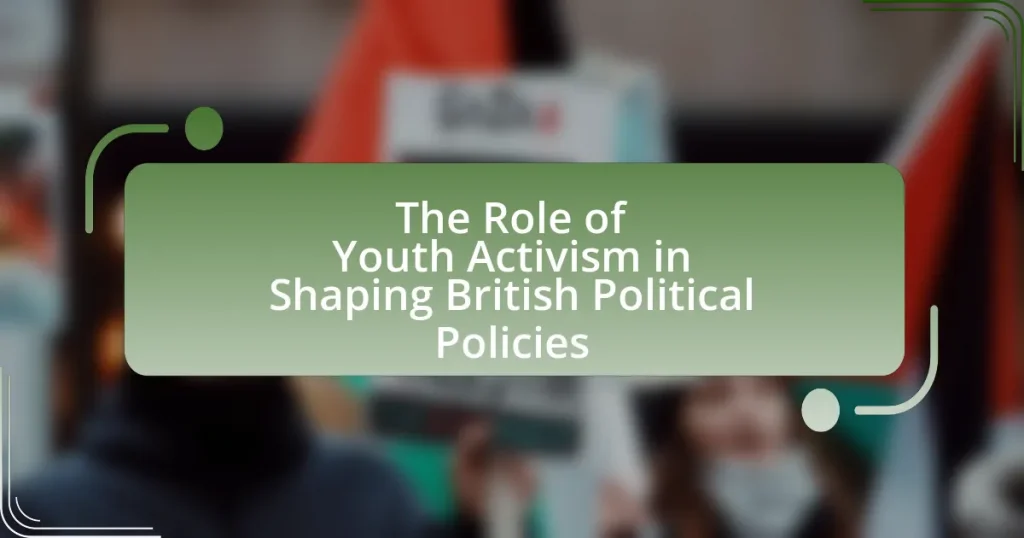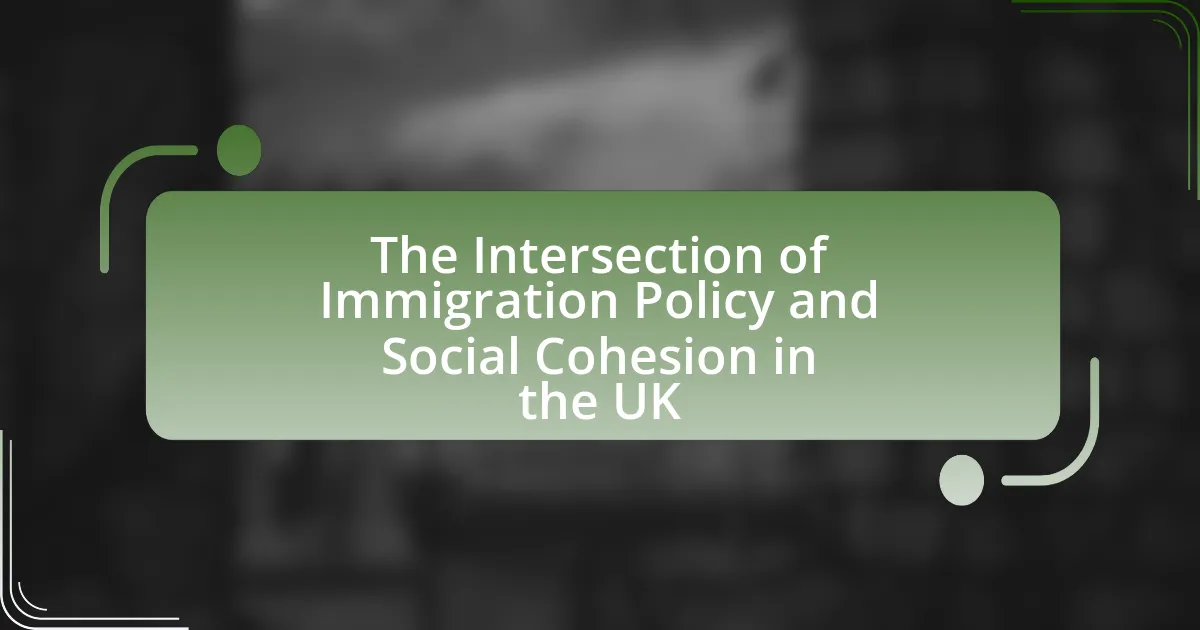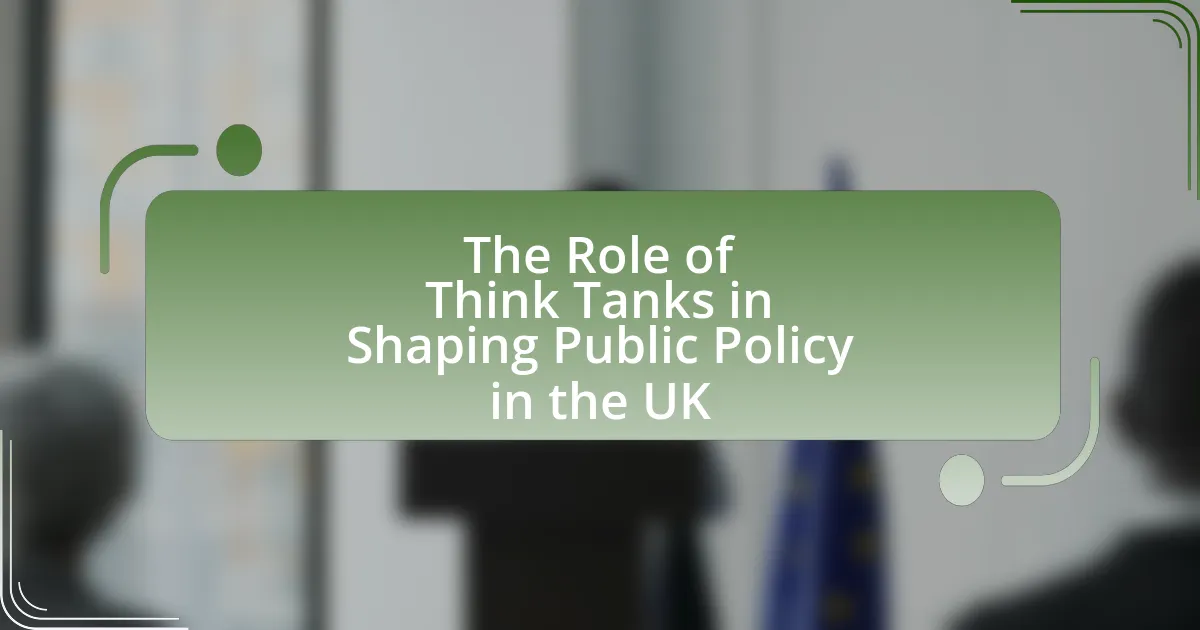Youth activism plays a pivotal role in shaping British political policies by mobilizing young people to advocate for critical issues such as climate change, education reform, and social justice. Historical movements, including the UK Youth Climate Strike and the Anti-Apartheid Movement, illustrate the significant impact of youth-led initiatives on legislative reforms. The article explores key movements, the strategies employed by young activists, and the challenges they face in influencing political discourse. It also highlights the importance of educational institutions in fostering political engagement among youth and discusses future trends in activism that may further shape political policies in the UK.
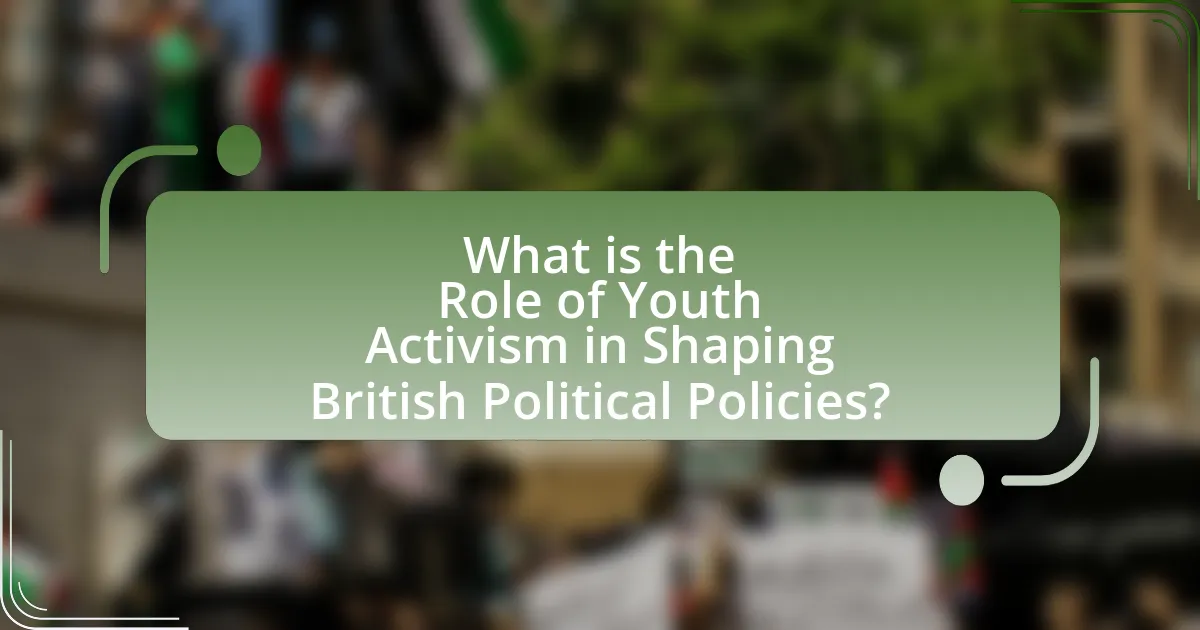
What is the Role of Youth Activism in Shaping British Political Policies?
Youth activism plays a crucial role in shaping British political policies by mobilizing young people to advocate for issues such as climate change, education reform, and social justice. This activism influences policymakers through organized protests, social media campaigns, and participation in political discourse, effectively amplifying youth voices in the political arena. For instance, the UK Youth Climate Strike movement, inspired by Greta Thunberg, has significantly impacted public awareness and government discussions on climate policy, leading to commitments like the UK’s pledge to achieve net-zero carbon emissions by 2050. Additionally, youth-led organizations, such as UK Youth and the British Youth Council, actively engage in policy consultations, ensuring that the perspectives of younger generations are considered in legislative processes.
How has youth activism historically influenced British political policies?
Youth activism has historically influenced British political policies by mobilizing young people to advocate for social change, leading to significant legislative reforms. For instance, the student protests of the late 1960s, particularly against the Vietnam War and for civil rights, pressured the government to reconsider its foreign policies and domestic social issues. Additionally, the 1980s saw youth-led movements, such as the Anti-Apartheid Movement, which garnered widespread support and ultimately influenced the UK’s stance on South Africa, leading to sanctions against the apartheid regime. More recently, the climate strikes initiated by young activists like Greta Thunberg have prompted discussions in Parliament about environmental policies, showcasing the ongoing impact of youth activism on shaping political agendas.
What key movements exemplify youth activism in British history?
Key movements that exemplify youth activism in British history include the 1960s anti-nuclear movement, the 1980s Campaign for Nuclear Disarmament (CND), and the recent climate strikes led by youth activists like Greta Thunberg. The anti-nuclear movement in the 1960s saw significant youth participation, with protests against nuclear weapons influencing public policy and leading to debates on disarmament. The CND, particularly in the 1980s, mobilized young people to advocate for peace and disarmament, resulting in widespread demonstrations and political pressure on the government. More recently, the climate strikes initiated by young activists have galvanized a global movement, demanding urgent action on climate change and influencing political discourse in the UK, as evidenced by the UK Parliament declaring a climate emergency in 2019.
How did these movements impact specific political policies?
Youth activism significantly influenced specific political policies in the UK by driving legislative changes and shaping public discourse. For instance, the climate strikes led by youth activists, particularly those inspired by Greta Thunberg, prompted the UK government to declare a climate emergency in 2019. This declaration catalyzed the introduction of policies aimed at reducing carbon emissions, such as the legally binding target to reach net-zero emissions by 2050. Additionally, movements advocating for mental health awareness, such as the #MentalHealthAwareness campaign, resulted in increased funding for mental health services and the integration of mental health education into school curricula. These examples illustrate how youth-led movements have directly impacted political policies by raising awareness and compelling governmental action.
Why is youth activism important in contemporary British politics?
Youth activism is important in contemporary British politics because it drives social change and influences policy decisions. Young activists mobilize around critical issues such as climate change, education reform, and social justice, often bringing fresh perspectives and urgency to political discourse. For instance, the youth-led climate strikes in 2019, inspired by Greta Thunberg, saw millions of young people participating, which pressured the UK government to declare a climate emergency. This demonstrates how youth activism can effectively shape political agendas and compel policymakers to respond to the concerns of younger generations.
What unique perspectives do young activists bring to political discourse?
Young activists bring fresh, innovative perspectives to political discourse by prioritizing issues such as climate change, social justice, and inclusivity. Their engagement often reflects a deep understanding of the interconnectedness of global challenges, as evidenced by movements like Fridays for Future, which mobilized millions worldwide to advocate for urgent climate action. This generation’s use of digital platforms enables rapid dissemination of ideas and fosters a sense of community, allowing them to challenge traditional political narratives effectively. Furthermore, young activists often emphasize the importance of intersectionality, recognizing how various forms of discrimination overlap, which enriches discussions and promotes more comprehensive policy solutions.
How does youth activism address current social and political issues?
Youth activism addresses current social and political issues by mobilizing young people to advocate for change, influencing policies, and raising awareness on critical topics such as climate change, racial equality, and mental health. For instance, movements like Fridays for Future, initiated by Greta Thunberg, have galvanized millions of young activists globally to demand urgent action on climate policies, leading to increased political discourse and commitments from governments. Additionally, youth-led organizations, such as Black Lives Matter UK, have highlighted systemic racism and prompted legislative discussions on police reform and social justice. These examples demonstrate how youth activism not only amplifies marginalized voices but also pressures political leaders to respond to pressing societal challenges.
What challenges do youth activists face in influencing political policies?
Youth activists face significant challenges in influencing political policies, primarily due to systemic barriers, lack of representation, and limited access to decision-makers. Systemic barriers include age-related biases that often dismiss the contributions of younger individuals, leading to their exclusion from critical discussions. Additionally, youth activists frequently encounter difficulties in mobilizing resources and support, as they may lack the financial backing and organizational infrastructure that established groups possess. Limited access to decision-makers further complicates their efforts, as political leaders may prioritize the interests of older constituents over those of younger populations. These challenges are evidenced by studies indicating that youth voter turnout remains lower than that of older demographics, which can diminish the perceived urgency of youth-led initiatives in political agendas.
What barriers exist for young people in political engagement?
Barriers for young people in political engagement include lack of access to information, feelings of disenfranchisement, and limited opportunities for participation. Research indicates that many young individuals feel disconnected from political processes, often due to a perception that their voices are not valued or heard. According to a 2021 study by the UK Youth Parliament, 60% of young people reported feeling that politicians do not represent their interests, which contributes to apathy and disengagement. Additionally, socioeconomic factors, such as financial constraints and educational disparities, further hinder their ability to engage actively in political activities.
How do societal perceptions of youth activism affect its effectiveness?
Societal perceptions of youth activism significantly affect its effectiveness by influencing the level of support and legitimacy that young activists receive. When society views youth activism positively, it often leads to increased media coverage, public engagement, and political responsiveness, as seen in movements like the UK Youth Climate Strike, which garnered widespread attention and support from various demographics. Conversely, negative perceptions can result in dismissal of youth voices, undermining their efforts and reducing their impact on policy change. Research indicates that when young activists are perceived as credible and informed, their initiatives are more likely to lead to tangible political outcomes, as demonstrated by the successful lobbying efforts of youth-led organizations during the Brexit negotiations.
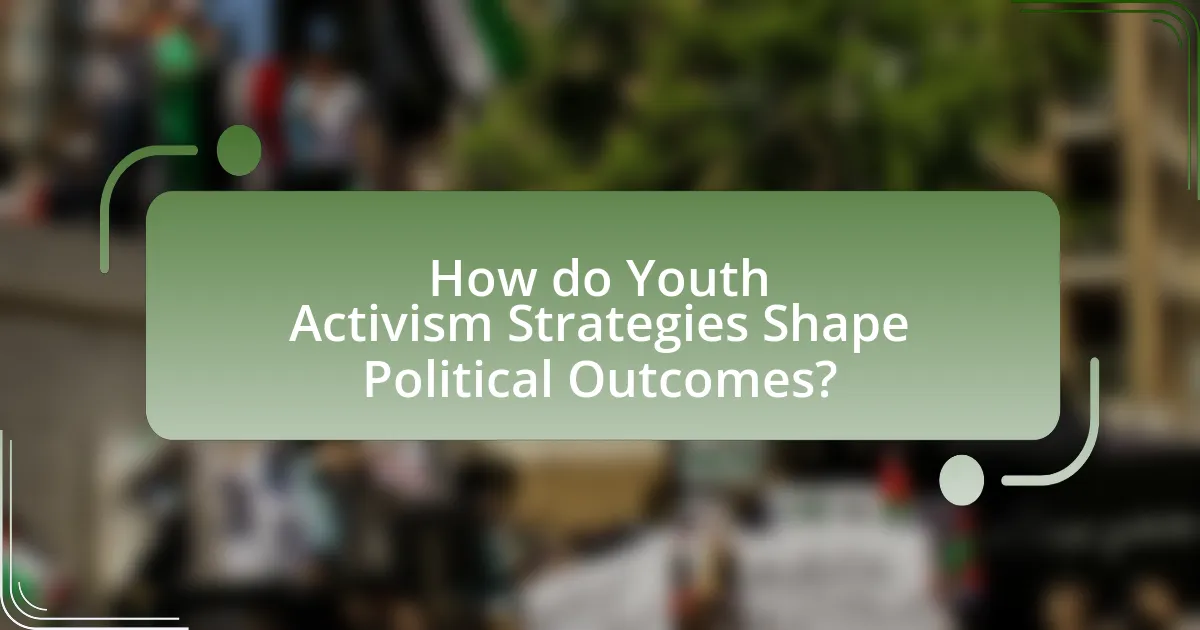
How do Youth Activism Strategies Shape Political Outcomes?
Youth activism strategies significantly shape political outcomes by mobilizing young people to advocate for specific issues, influencing public opinion and policy decisions. For instance, campaigns like the UK Student Climate Network have effectively pressured the government to declare a climate emergency, demonstrating how organized youth movements can lead to tangible policy changes. Additionally, the use of social media platforms allows youth activists to reach a broader audience, amplifying their messages and increasing engagement, as seen in the widespread support for movements like Black Lives Matter. This combination of grassroots organizing and digital outreach creates a powerful force that can sway political agendas and compel lawmakers to respond to the demands of younger constituents.
What strategies are commonly employed by youth activists in the UK?
Youth activists in the UK commonly employ strategies such as grassroots organizing, social media campaigns, and coalition-building to influence political policies. Grassroots organizing involves mobilizing local communities to advocate for specific issues, exemplified by movements like the UK Student Climate Network, which has successfully rallied students for climate action. Social media campaigns leverage platforms like Twitter and Instagram to raise awareness and engage a broader audience, as seen in the #BlackLivesMatter movement, which has galvanized support for racial justice. Coalition-building among various youth-led organizations enhances their collective impact, allowing for a unified front on issues such as climate change and social justice, demonstrated by the collaboration between Extinction Rebellion and other youth groups during protests.
How do social media platforms enhance youth activism efforts?
Social media platforms enhance youth activism efforts by providing accessible tools for communication, organization, and mobilization. These platforms allow young activists to share information rapidly, connect with like-minded individuals, and amplify their messages to a broader audience. For instance, the use of hashtags on platforms like Twitter and Instagram has been pivotal in organizing movements such as Black Lives Matter, which gained significant traction among youth. According to a 2020 study by the Pew Research Center, 71% of teens reported using social media to engage in political discussions, demonstrating its effectiveness in fostering political awareness and activism among young people.
What role do grassroots movements play in shaping political agendas?
Grassroots movements play a crucial role in shaping political agendas by mobilizing community members to advocate for specific issues, thereby influencing policymakers. These movements often emerge from local concerns and can effectively raise awareness, generate public support, and apply pressure on political leaders to address their demands. For instance, the youth-led climate strikes initiated by Extinction Rebellion and Fridays for Future have significantly impacted political discourse in the UK, leading to increased governmental focus on climate policies and commitments to net-zero emissions by 2050. This demonstrates how grassroots activism can translate local issues into national political priorities, ultimately shaping the legislative landscape.
How do youth-led campaigns influence political decision-making?
Youth-led campaigns significantly influence political decision-making by mobilizing public opinion and engaging policymakers through advocacy and grassroots efforts. These campaigns often leverage social media to amplify their messages, reaching a wider audience and creating pressure on political leaders to respond to youth concerns. For instance, the UK Youth Climate Coalition successfully influenced the UK government to declare a climate emergency in 2019, showcasing how organized youth activism can lead to tangible policy changes. Additionally, research from the University of Cambridge indicates that youth participation in political processes increases the likelihood of addressing issues such as climate change, education reform, and social justice, thereby shaping legislative agendas.
What examples illustrate successful youth-led political campaigns?
Successful youth-led political campaigns include the UK Student Climate Network’s school strike movement and the “Youth Strike 4 Climate” initiative. The UK Student Climate Network mobilized thousands of students to protest for climate action, significantly influencing public discourse and prompting political leaders to address climate policies. The “Youth Strike 4 Climate” campaign, inspired by Greta Thunberg, saw students across the UK participating in strikes, which led to increased media attention and commitments from politicians to prioritize climate change in their agendas. These campaigns demonstrate the power of youth activism in shaping political policies and engaging the public in critical issues.
How do these campaigns mobilize support from broader demographics?
These campaigns mobilize support from broader demographics by utilizing targeted messaging and inclusive strategies that resonate with diverse groups. For instance, youth-led campaigns often leverage social media platforms to reach various age groups, employing relatable content that addresses specific concerns such as climate change, education, and social justice. Research indicates that campaigns like the UK Student Climate Network have successfully engaged over 100,000 young people across different backgrounds, demonstrating the effectiveness of grassroots organizing and coalition-building. By fostering partnerships with established organizations and utilizing intersectional approaches, these campaigns effectively broaden their appeal and enhance participation across demographic lines.
What role do educational institutions play in fostering youth activism?
Educational institutions play a crucial role in fostering youth activism by providing a platform for critical thinking, civic engagement, and social awareness. These institutions often incorporate curricula that emphasize social justice, political participation, and community service, which empower students to understand and address societal issues. For instance, programs like Model United Nations and debate clubs encourage students to engage in discussions about global and local challenges, thereby cultivating leadership skills and a sense of responsibility. Research indicates that students involved in such programs are more likely to participate in activism, as evidenced by a study from the National Union of Students, which found that 70% of students who engaged in extracurricular activities related to social issues reported increased political engagement.
How can schools and universities support political engagement among students?
Schools and universities can support political engagement among students by integrating civic education into their curricula and providing platforms for student-led initiatives. Civic education equips students with knowledge about political systems, rights, and responsibilities, fostering informed participation. For instance, the UK government emphasizes the importance of citizenship education in schools, which has been linked to increased political awareness and engagement among youth. Additionally, institutions can facilitate debates, workshops, and forums that encourage students to discuss political issues, thereby enhancing their critical thinking and public speaking skills. Research shows that active participation in such activities correlates with higher voter turnout and civic involvement in adulthood.
What programs exist to encourage youth participation in politics?
Programs that encourage youth participation in politics include the UK Youth Parliament, which provides a platform for young people to voice their opinions and influence decision-making. Additionally, the National Citizen Service (NCS) engages youth in community projects and civic activities, fostering a sense of responsibility and political awareness. The “Votes at 16” campaign advocates for lowering the voting age, aiming to empower younger citizens in the democratic process. These initiatives are supported by various organizations, including the British Youth Council, which actively promotes youth engagement in political discourse and policy-making.
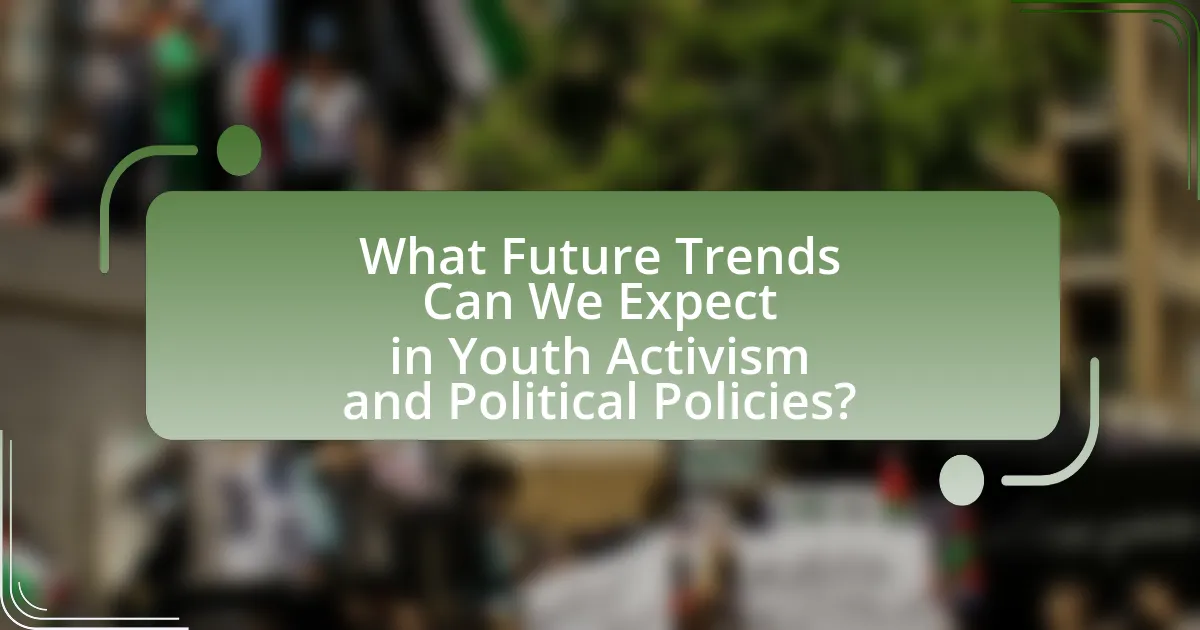
What Future Trends Can We Expect in Youth Activism and Political Policies?
Future trends in youth activism and political policies will likely include increased digital engagement, intersectionality in social justice movements, and a focus on climate action. Digital platforms enable young activists to mobilize quickly and effectively, as seen in movements like Black Lives Matter and Fridays for Future, which utilize social media to amplify their messages and organize protests. Additionally, the growing recognition of intersectionality highlights the interconnectedness of various social issues, prompting youth activists to advocate for comprehensive policies that address multiple forms of inequality. Climate action remains a central concern, with young people increasingly demanding robust governmental responses to environmental crises, as evidenced by the rise of youth-led initiatives and global climate strikes. These trends indicate that youth activism will continue to shape political policies in the UK and beyond, pushing for more inclusive and sustainable governance.
How is the landscape of youth activism evolving in the UK?
The landscape of youth activism in the UK is evolving through increased digital engagement and intersectionality in social issues. Young activists are leveraging social media platforms to mobilize support, raise awareness, and organize protests, as seen in movements like Black Lives Matter and climate activism led by figures such as Greta Thunberg. This digital shift allows for rapid dissemination of information and broader participation, with a notable increase in youth-led organizations addressing diverse issues such as mental health, racial equality, and environmental sustainability. According to a 2021 report by the UK Youth Parliament, 70% of young people believe that activism can lead to real change, highlighting their growing confidence in influencing political policies.
What emerging issues are young activists focusing on today?
Young activists today are primarily focusing on climate change, social justice, mental health, and digital rights. Climate change remains a critical issue, with youth-led movements like Fridays for Future advocating for urgent action to combat global warming and promote sustainable practices. Social justice is another key area, as young activists push for racial equality, gender rights, and LGBTQ+ rights, often mobilizing through social media platforms to raise awareness and drive change. Mental health advocacy has gained momentum, with young people calling for better mental health resources and support systems, particularly in educational settings. Additionally, digital rights, including privacy concerns and the impact of technology on society, are increasingly important as young activists seek to address issues related to data protection and online freedom. These issues reflect the priorities and concerns of a generation that is actively engaged in shaping political discourse and policy in the UK.
How are technological advancements shaping future activism efforts?
Technological advancements are significantly shaping future activism efforts by enhancing communication, mobilization, and awareness. Digital platforms enable activists to reach wider audiences instantly, facilitating the rapid dissemination of information and organizing events. For instance, social media campaigns like #BlackLivesMatter have demonstrated how technology can galvanize support and drive social change, leading to increased visibility of issues and greater public engagement. Additionally, tools such as crowdfunding platforms allow activists to secure funding for their initiatives, further empowering grassroots movements. The integration of data analytics also aids in understanding public sentiment and tailoring messages effectively, making activism more strategic and impactful.
What potential impacts could youth activism have on future British political policies?
Youth activism could significantly influence future British political policies by driving legislative changes and shaping public discourse. The mobilization of young people around issues such as climate change, social justice, and education reform has already led to increased political engagement and responsiveness from policymakers. For instance, the youth-led climate strikes in 2019 prompted the UK government to declare a climate emergency, showcasing how activism can directly impact policy agendas. Additionally, surveys indicate that younger voters prioritize issues like environmental sustainability, which may compel political parties to adopt more progressive platforms to attract this demographic.
How might youth activism influence upcoming elections and policy reforms?
Youth activism can significantly influence upcoming elections and policy reforms by mobilizing young voters and shaping public discourse. For instance, the 2019 UK general election saw a notable increase in youth voter turnout, driven by campaigns focused on climate change and social justice, which were championed by youth-led movements like Extinction Rebellion and the UK Student Climate Network. This engagement not only pressured political parties to address these issues in their platforms but also led to policy proposals aimed at sustainability and equity. Furthermore, research from the British Youth Council indicates that young activists are increasingly using social media to amplify their messages, thereby reaching a broader audience and impacting the political agenda.
What role will intergenerational collaboration play in shaping political futures?
Intergenerational collaboration will play a crucial role in shaping political futures by fostering dialogue and understanding between different age groups, which can lead to more inclusive and representative policies. This collaboration allows for the blending of innovative ideas from youth activism with the experience and historical context provided by older generations, creating a comprehensive approach to political challenges. For instance, studies have shown that when younger and older individuals work together, they can address issues like climate change more effectively, as evidenced by initiatives such as the UK Youth Climate Coalition, which combines youth activism with the insights of seasoned policymakers. This synergy not only enhances policy development but also encourages civic engagement across generations, ultimately leading to a more robust democratic process.
What practical steps can young people take to enhance their political influence?
Young people can enhance their political influence by actively participating in local governance, engaging in community organizing, and utilizing social media platforms for advocacy. Participation in local governance, such as attending town hall meetings or joining youth councils, allows young individuals to voice their concerns and influence decision-making processes. Community organizing empowers youth to mobilize peers around specific issues, fostering collective action that can lead to policy changes. Additionally, leveraging social media enables young people to raise awareness, share information, and connect with broader movements, amplifying their voices and reaching a wider audience. These steps are supported by the increasing recognition of youth activism’s impact on political discourse, as evidenced by movements like the UK Student Climate Network, which has successfully influenced climate policy discussions in the UK.
How can youth activists effectively engage with policymakers?
Youth activists can effectively engage with policymakers by utilizing strategic communication, building coalitions, and leveraging social media platforms. Strategic communication involves clearly articulating their demands and policy proposals, which can be supported by data and research to demonstrate the urgency and relevance of their issues. For instance, the UK Youth Parliament has successfully influenced local councils by presenting well-researched reports on youth issues, showcasing the effectiveness of informed advocacy.
Building coalitions with other organizations amplifies their voice and increases their influence. Collaborations with established NGOs or community groups can provide additional resources and credibility, as seen in campaigns like the UK’s climate strikes, where youth activists partnered with environmental organizations to push for policy changes.
Leveraging social media platforms allows youth activists to reach a broader audience and engage directly with policymakers. Campaigns that go viral can attract media attention and prompt policymakers to respond, as evidenced by the global impact of the #FridaysForFuture movement initiated by Greta Thunberg. This demonstrates that a well-coordinated online presence can translate into real-world political engagement and influence.
What resources are available for young activists to develop their skills?
Young activists can access various resources to develop their skills, including online courses, mentorship programs, and community organizations. Online platforms like Coursera and edX offer courses on activism, public speaking, and leadership, enabling young individuals to learn at their own pace. Mentorship programs, such as those provided by organizations like the Young Leaders Network, connect young activists with experienced professionals who can offer guidance and support. Additionally, community organizations, such as the British Youth Council, provide workshops and training sessions focused on advocacy, campaigning, and civic engagement, equipping young activists with practical skills necessary for effective participation in political processes.
